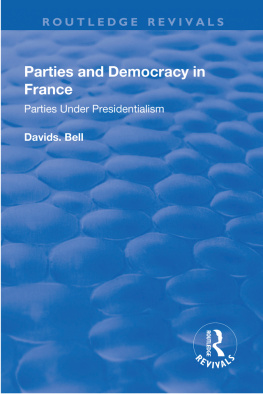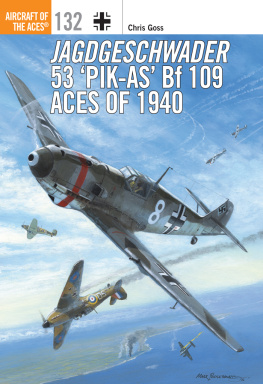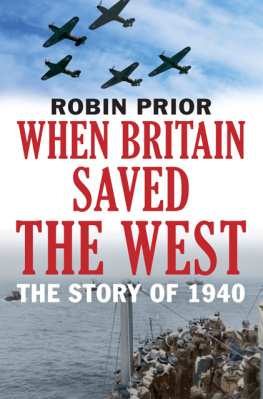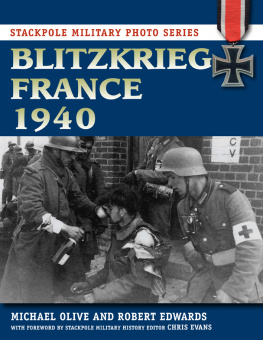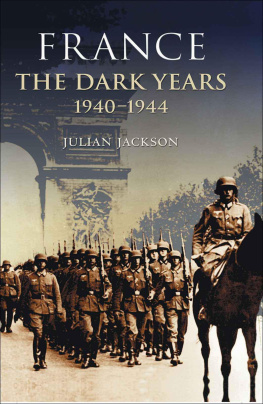FRANCE AND BRITAIN 19401994:
THE LONG SEPARATION
FRANCE AND
BRITAIN
19401994:
The Long Separation
P. M. H. Bell
First published 1997 by Addison Wesley Longman Limited
Published 2014 by Routledge
2 Park Square, Milton Park, Abingdon, Oxon OX14 4RN
711 Third Avenue, New York, NY 10017, USA
Routledge is an imprint of the Taylor & Francis Group, an informa business
Copyright 1997, Taylor & Francis.
The right of Philip Bell to be identified as author of this Work has been asserted by him in accordance with the Copyright, Designs and Patents Act 1988.
All rights reserved. No part of this book may be reprinted or reproduced or utilised in any form or by any electronic, mechanical, or other means, now known or hereafter invented, including photocopying and recording, or in any information storage or retrieval system, without permission in writing from the publishers.
Notices
Knowledge and best practice in this field are constantly changing. As new research and experience broaden our understanding, changes in research methods, professional practices, or medical treatment may become necessary.
Practitioners and researchers must always rely on their own experience and knowledge in evaluating and using any information, methods, compounds, or experiments described herein. In using such information or methods they should be mindful of their own safety and the safety of others, including parties for whom they have a professional responsibility.
To the fullest extent of the law, neither the Publisher nor the authors, contributors, or editors, assume any liability for any injury and/or damage to persons or property as a matter of products liability, negligence or otherwise, or from any use or operation of any methods, products, instructions, or ideas contained in the material herein.
ISBN 13: 978-0-582-28920-8 (pbk)
British Library Cataloguing-in-Publication Data
A catalogue record for this book is available from the British Library
Library of Congress Cataloging-in-Publication Data
Bell, P. M. H. (Philip Michael Hett), 1930
France and Britain 19401994: the long separation / P.M.H. Bell.
p. cm.
Includes bibliographical references and index.
ISBN 0-582-28920-3
1. Great Britain Foreign relations1945 2. Great Britain Foreign relations19361945. 3. World War, 19391945Diplomatic history. 4. Great BritainForeign relationsFrance. 5. France Foreign relationsGreat Britain. 6. FranceForeign relations19401945. 7. FranceForeign relations1945
I. Title.
DA589.8.B45 1997
| 327.41044dc20 | 96-28654
CIP |
Contents
A Complicated War:
(i) Britain, Vichy and de Gaulle, 19401942
A Complicated War:
(ii) Britain and de Gaulle, 19431944
This book completes the story of Franco-British relations and views across the Channel in the twentieth century, begun in France and Britain 19001940: Entente and Estrangement. It starts with the painful separation between the two countries in the summer of 1940, and comes up to the opening of the Channel Tunnel in 1994. The writing has been a labour of love, and I hope that this book will appeal to all those in Britain who hold France high in their affection, as well as to those whose work leads them to make a study of relations between the two countries. (The two categories doubtless overlap a good deal.)
For a second time, I am happy to acknowledge, with warm gratitude, the many obligations I have incurred. I owe a great debt to those friends who have read drafts, with keen eyes and careful judgement: David Dutton, John Lukacs, Ralph White and Charles Williams. The University of Liverpool allowed me a years study leave to work on this book; the British Academy and the Association for the Study of Modern and Contemporary France awarded me research grants, for which I am most grateful. I have learned much from conversations with participants in the events described in this book, and I am particularly grateful to the following for allowing me to take up their time and learn from their experience: Charles Bremner, Francis Cammaerts, Jean-Louis Crmieux-Brilhac, Sir Nicholas Henderson, Pierre Maillard, Maurice Schumann, Jean-Marie Soutou, Hugh Verity.
Much of the research, reading and writing was carried out during long residence in Paris. I was made most welcome by French historians, and learned much in seminars and even more from conversation.
From a lifetime of work on this subject, there is much archival research behind this book; but by its nature it is primarily a work of synthesis. My main intellectual debts are to those who have worked in the field before me, and I gladly offer my recognition in the bibliographical essay. It is inevitable that the texture of the work grows thinner as we approach very recent times, when the archives are not yet open and perspectives are foreshortened; but there are already pioneers even on the newest paths. Footnotes are used to give sources for quotations and statistics, and sometimes to refer to differing views of complicated issues. Quotations from French sources have been translated, in nearly every case by my wife, who has indeed shared all the toils and delights of this book from start to finish.
Two points relating to style and presentation deserve particular mention. One is a matter of nomenclature. France and the French are relatively straightforward words, which may be used with little fear of misunderstanding. Britain, on the other hand, is a short-hand expression, to denote the state whose proper title is the United Kingdom of Great Britain and Northern Ireland; and British describes a nationality within which the English, Scots, Welsh and Northern Irish have retained distinct identities. The French often refer simply to Angleterre and les Anglais, even when they mean Britain and the British; and in translating quotations I have followed the practice of the French writers concerned. For my own part, I have tried to refer always to Britain, and to Franco-British relations, whenever that is proper, reserving England and Anglo-French relations for their own precise meanings.
The other matter is the use of initials and abbreviations. We live in an age where abbreviations proliferate: NATO, EEC, CAP, EMU, and so on. Their purpose is usually the admirable one of securing brevity, but they can also lead to obscurity, partly because they pass so quickly out of fashion. (Who except a few specialists now remembers what FRITALUX stood for? It might well have been a cooking oil or a washing powder.) Therefore, except in a few very well-known cases (e.g. NATO for the North Atlantic Treaty Organisation, EEC for the European Economic Community), I have written out names in full, using abbreviations only in close proximity to the full versions.
P. M. H. Bell
Paris and Kew
199496
France and Britain 19001940: Entente and Estrangement examined relations between the two countries in the first part of the twentieth century.1 That book ended with the German victory in France in June 1940, the French armistice, and the British determination to fight on. At that point, the two countries had gone from the Entente cordiale earlier in the century to a profound estrangement. It remained to be seen how permanent that estrangement would prove to be. The present book takes up the story at the end of June 1940, and brings it to the opening of the Channel Tunnel in 1994. As before, the main thread is the political relationship between France and Britain, interwoven with military and economic sub-plots, and combined with discussion of the images which the two countries have formed of one another over the years. This last strand views across the Channel is less prominent than in the earlier book, at least in part because it seems that Franco-British relations did not fully recover from the estrangement of 1940, when France and Britain took such radically different courses.



